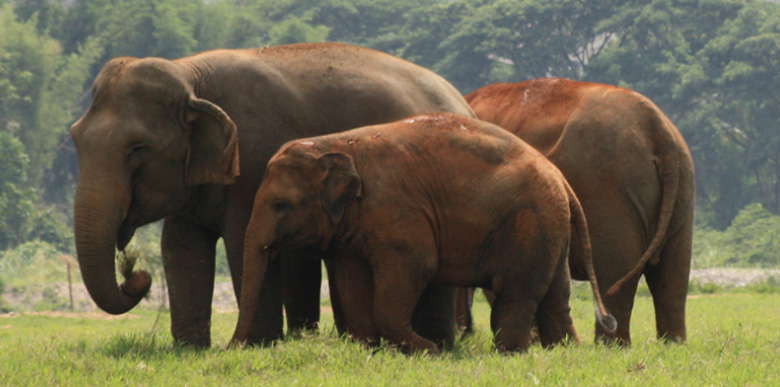A response and an apology

On Monday afternoon I posted an account of seeing a baby elephant on the side of the road while on my trip to Southeast Asia in June. In it I explain that when Jamie Wright said she wanted to see an elephant walking down the street that I had no idea that there were places on earth where elephants were actually walking down the street. I think this admission along with my love for animals clued some of you in to the fact that I probably had no idea that elephants in that part of the world are routinely kidnapped, abused and tortured, and you urged me to research this ongoing atrocity. Some of you were a little more respectful than others in your urging, and it was those others who forced me to close comments. I did not want to respond to those comments or to any of the other vitriol on other social channels because I wanted to approach this with the thought and measure it deserves.
I was totally clueless, totally ignorant. I had no knowledge of this practice.
Should I have been? I don’t know. I have never traveled anywhere specifically to ride an elephant or had it on a list of things I wanted to do. I’ve never seen an exposé revealing that this is going on and that tourists are the ones primarily fueling this barbaric behavior. I didn’t even know that the implement in the hand of the man with the infant elephant was used to inflict pain. I did not research the treatment of elephants in Southeast Asia prior to my trip because I was traveling there for an entirely different cause.
If you will give me the benefit of the doubt for one moment, what I wrote about on Monday was in no way intended to promote the torture of elephants. I had only recently been told that we might see an elephant walking down the street, and when we did, when it actually happened, when an infant elephant showed up next to our car, we hopped out to take a photo of it. The experience lasted less than ten minutes. My reaction was visceral and totally uninformed.
I was wrong.
We did not travel to Southeast Asia to ride elephants, and from the research I have been doing coupled with information many of you have sent me, I would urge you to refrain from doing so as well. In fact, I’d urge you not to pose with an elephant like I did. This excellent piece by Matthew Karsten, a self-described “adventure travel addict and photographer” details the very many reasons why not:
This industry thrives because foreign visitors all want to ride elephants, or watch them do tricks, paying good money for the privilege.
But the fact is that wild elephants need to be tamed before they can be ridden. Except the taming process in Southeast Asia is not the same as with a wild horse. It’s much more brutal, and is accomplished when the elephants are very young.
Wild elephants won’t let humans ride on top of them. So in order to tame a wild elephant, it is tortured as a baby to completely break its spirit. The process is called Phajaan, or “the crush”.
It involves ripping baby elephants away from their mothers and confining them in a very small space, like a cage or hole in the ground where they’re unable to move.
The baby elephants are then beaten into submission with clubs, pierced with sharp bull-hooks, and simultaneously starved and deprived of sleep for many days.
Most people who participate in elephant tourism in Thailand are completely unaware of how they are treated. I know many friends who have ridden elephants. It’s easy to understand why people do it. I almost rode them myself.
I am ashamed that I was helping to perpetuate the miserable existence of that animal, that I was involved in any way in its mistreatment, and I apologize. I know better now. What you see in those photos is a purely emotional response to being in the presence of such a magnificent creature, one who has unknowingly moved me and hopefully others to recognize that we should not facilitate this savagery.
Through Matthew Karsten’s article I learned about Save Elephant Foundation located in northern Thailand, an organization that rescues and rehabilitates captive elephants, many who were kidnapped and tortured to perform circus tricks and give rides to tourists. I spent several hours reading about their work and have decided to give the elephant care division of their organization a recurring monthly donation of $35, the same amount of money I donated to help fight human trafficking in the same part of the world.
If you’d like to learn more about the abuse and trafficking of these extraordinary animals, here are some useful links:
Save the Elephants
The Clinton Global Initiative’s Partnership to Save Africa’s Elephants
Defender’s of Wildlife Adopt an Elephant
World Wildlife Fund: Taking a Stand Against Wildlife Crime
Freeland
Change.org: Stop Supporting Elephant Abuse
Ian Somerhalder Foundation: Together We Can Stop Circus Animal Abuse
Wildlife Conservation Society
Ignorance is no excuse, but my hope is that those I offended so harshly will find some way to forgive me.

